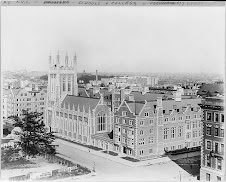As I said, just wanted to pass along a few thoughts about this marriage thing.
I think the very real need to be "married" goes beyond the concept of equal rights under the law or from another perspective forcing same sex marriages on a society that might not be ready for it. Your question was why do some feel they want or even need this so badly? Dealing with the politics and church political ramifications of it are very real but I feel they are a smoke screen for the real discussion as to "why?"
I can tell you that in realizing and/or one's "orientation" there is a struggle no matter who you are. It is a psychological process that isolates and one cannot imagine that anyone else has ever gone through what you are going through at that moment. Things to face are rejection of parents-either lovingly or violently (lovingly="we understand and love you but what did we do wrong, we will never have grandkids, our lives are forever changed now, etc." while violently=how could you do this to us, if you can live the right way get out, why did God have this abomination come from me, that is a disgusting, depraved community and deserve whatever it gives you, etc".)
Despite the ultimate reactions, the truth of the matter is that the training and ideals of family (mostly heteronormative ideals) are ingrained into LGBTQ folk just as they are into hetero folk. We've all been groomed to find partnership in life, become family with that person and that the final true public/spiritual testament to that love is to be married in the eyes of God and a company assembled. Heterosexuals have a choice of whether or not this is necessary for their lives. Heteros have the privelege (damn Union word slipped out) of whether or not to be married, whether or whether or not to have children, etc. The point is that the common starting point for us all is that ideal ingrained into us from childhood-marriage.
LGBTQ life at least in regards to these proscribed ideals, is full of personal loss. Identity has to be reformed and all of those cultural/religious aspirations either must be given up or somehow redefined to match the identity that has been shaped for you with the identity that has been shaped by you in no small part by your sexual affinity. It is here where I think the question "why marriage" can be answered. It seems to me that identity is, especially once we realize that we have some say in our own identity formation, something we cling to for dear psychological and spiritual life. The less we have to shed from those core years of identity formation the more secure we are in growing into our own person. Our choices become clearer because our foundation is strong.
In LGBTQ identity formation, those building blocks that are cultural, familial, and societal are the hardest to reframe because our input on their importance in our lives has been so limited. It is like the game Jenga-trying to build an identity while with each round of life you realize the pieces of your identity that culture and society takes away from your foundation. You can still grow and be strong and find where the new pieces fit but you are forever aware of the precarious nature of your identity because those foundational pieces like marriage, civil rights, human rights-all the things we grow up expecting-- are slowly being removed because of your sexual affinity/orientation. It's not even that it is a malicious thing. It's just the way things are set up. I think marriage represents much of this foundational identity formation. Now that there is even the remotest of possibilities of putting this foundational piece of identity formation back in place, people are reclaiming the piece.
Of course, there is the issue of whether or not these social constructs cause more damage than good. But at this stage of the game it doesn't matter, that debate will go on much ad infinitum. The fact is that these constructs are in place and until equality exists the place of conversation is not a level playing field. Strangely enough it seems to me the fight for marriage equality is more of a fight for a place of privelege from which one can choose whether or not to marry. That's my personal opinion, but it seems to me a perverse use of luxury. But then again, isn't so much of what we fight for a perverse pursuit of luxury?
Saturday, November 29, 2008
Subscribe to:
Post Comments (Atom)







No comments:
Post a Comment